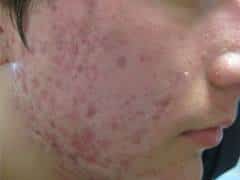The following criteria can help you determine if it is time to make an appointment with one of our dermatology offices:
Acne: Most over-the-counter products to treat acne contain either benzoyl peroxide or salicylic acid. If you continue to get new acne bumps or blemishes despite using these products, it would be a good idea to schedule an appointment as you may need prescription products to control the breakouts. One of our healthcare providers can also help determine the factors that might be contributing to your acne breaks out.

Rashes: Various skin conditions, such as eczema, psoriasis and seborrheic dermatitis (commonly known as dandruff) can be associated with uncontrollable itching and irritation as well as severe flaking or inflammation. When over-the-counter medications are not sufficient enough to control the symptoms noted above it would be a good idea to see one of our providers to start prescription medications. Sometimes the itching and inflammation is so severe that you may need an oral medication or even an injectable medication to manage the condition.
Melasma: This common skin condition causes brown to gray-brown patches on the face. Melasma is typically triggered by ultraviolet light from the sun or from a change in hormones, such as from pregnancy, birth control pills or hormone replacement medications. Sometimes melasma can fade on its own. However, if you have been suffering from melasma for years you may want to schedule an appointment at one of our offices to consider various treatment options, such as a prescription strength lightening cream, chemical peels or even laser treatment. Just remember that one of the best ways to prevent melasma from getting worse is to use a broad-spectrum sunscreen with SPF 30 or greater containing titanium dioxide and/or zinc oxide as the active ingredients.


Scars: If you suffer from red or depressed acne scars, there are several treatment options that our office can offer. Depending on the severity of the scar, the treatment options can include topical medications, a series of chemical peels, microneedling treatments, or laser treatments. Another type of scar that a dermatology office can treat is keloid scars, which are raised, thickened scars. These scars can also be red and itchy. Keloid scars are commonly treated with a series of cortisone injections every 3-4 weeks. Red, thickened scars can be treated with a combination of laser treatment and cortisone injections. Aside from cortisone injections and laser therapy, some keloids can be treated with surgical removal. Although this may seem like a permanent solution, it is important to know that most keloids will return after surgery.
These are just a few reasons to know that it’s time to visit a dermatology office. If you have any questions or concerns regarding your skin, do not hesitate to schedule an appointment with one of our highly qualified providers!

